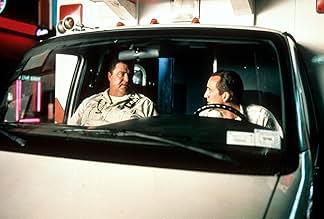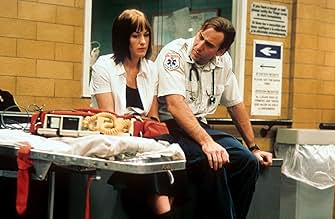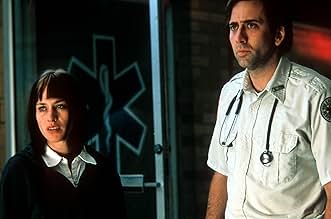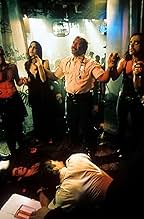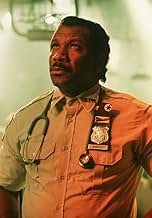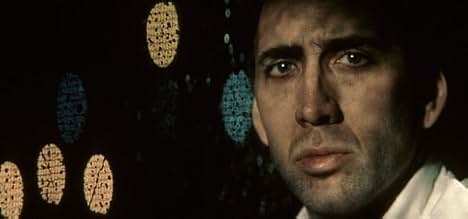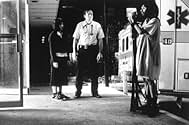Perseguido pelos pacientes que ele não pôde salvar, um paramédico de Manhattan luta para manter sua sanidade por três noites turbulentas e agitadas.Perseguido pelos pacientes que ele não pôde salvar, um paramédico de Manhattan luta para manter sua sanidade por três noites turbulentas e agitadas.Perseguido pelos pacientes que ele não pôde salvar, um paramédico de Manhattan luta para manter sua sanidade por três noites turbulentas e agitadas.
- Direção
- Roteiristas
- Artistas
- Prêmios
- 2 vitórias e 5 indicações no total
- Mr. Burke
- (as Cullen Oliver Johnson)
- Captain Barney
- (as Arthur Nascarella)
- Dispatcher
- (narração)
- Direção
- Roteiristas
- Elenco e equipe completos
- Produção, bilheteria e muito mais no IMDbPro
Avaliações em destaque
Now, back in 1999 when this film was released, Cage was pretty much at the top of his game and you could guarantee that he'd put in a good performance, especially under an equally great director. Here we have none other than Martin Scorsese at the helm who is more than capable at keeping hold of Cage's reigns and making sure he doesn't do that 'over the topness' he sometimes slips into. The premise is great and there's plenty of scope for the story and characters to evolve. The films sports an equally impressive supporting cast including Patricia Arquette, Ving Rhames and John Goodman. So, baring all that in mind, it's hard to see that anything could go wrong with it.
I certainly don't hate 'Bringing Out the Dead.' I just feel that with that much talent at its disposal it should be a lot better than it is. The actors and direction are amazing, but where it falls down is a general lack of focus as to where the story is going and what genre the film wants to be. It flips from everything from romantic comedy to gritty drama almost every other scene and even flirts with the possibility of a supernatural element (loosely). There's not an awful lot of motivation for the supporting cast and they just seem to do things to provide Cage with something bad/dramatic to react to. The films plays out like a string of sketches/mini episodes that are loosely strung together by the flimsy of narratives.
If you're a fan of Cage and/or Scorsese, this is a 'must watch.' However, some may get a little tired with waiting for something to happen.
Scorsese creates a very real New York (before the gentrification of the Giuliani era) that is rarely seen in films. This is not the flashy and glitzy New York that is often shown in most movies. He goes deep into the psyche of a city that is crammed with 9 million people, some who are struggling just to stay afloat. As the character Mary says, "You have to be strong to survive in this city." Some of the scenes in the movie are so memorable and haunting such as Frank's hallucination of actually pulling people literally from the steam shrouded pavement and bringing them back to life and the harrowing, almost Christ-like sequence where Frank is saving a drug dealer from death as he dangles from a balcony.
Nicholas Cage, one of our finest actors working today, gives a brilliant performance of great emotional range that is draining to watch. You literally see him coming unglued piece by piece. This is his best performance since "Leaving Las Vegas". Patricia Arquette (Cage's wife) gives a very moving and subtle performance of a person who has been to hell and back while struggling to maintain some balance in the jungle. Goodman, Rhames and Sizemore turn out good performances as always playing Cage's co-pilots in the nightly journeys. Also standing out are Latin singer, Marc Anthony as a homeless crazy and Cliff Curtis as a drug dealer who provides an "oasis" for the stressed-out individuals of the city. An excellent director and a great script are a perfect formula for producing top-notch performances by actors and Scorsese and Shrader bring out the best in theirs.
With it's story of the lead character Frank cruising the streets making narrative comments about life in the city, comparisons will be made naturally to Scorsese's other brilliant work "Taxi Driver" with it's main character Travis Bickle, but those comparisons are normal and stop right there. Where Travis Bickle wanted to save people who did not need saving, Frank Pierce reaches out to people who desperately need saving, but does not always have the power to save as in the case of the homeless girl Maria, who haunts him constantly. Also Scorsese is too highly intelligent, creative and the ultimate professional to retread the same waters, he never takes the easy road. A Scorsese film is like any great film, it takes time to take it in and digest, because there are so many different layers added that need to be looked at long after the last reel finishes. This is a powerful piece of filmmaking proving once again that Martin Scorsese is one of the all-time great directors of this century. Highly Recommended. × × ××
Frank tells us at the movie's outset that he hasn't saved a life in months, and that he's beginning to believe in things like spirits that leave a body and don't want to come back. He's starting to feel like a "grief mop", like his only real responsibility is to "bear witness" to death and suffering. Frank and his partner Larry (John Goodman) are attempting to resuscitate a heart attack victim as the movie begins, and as the man's daughter Mary (Patricia Arquette) looks on in horror, Larry is successful in pulling him back from death's door. The overrun hospital, however, shoves him into a corner and keeps him drugged up, shocking him back to "life" when necessary. Mary tells Frank she hadn't spoken to her father for a long while before his attack, and in fact had often wished he were dead, but that now there's nothing she'd like more that to just hear his voice again. She was once a junkie but has now been clean for months, she tells him. Frank seems moved by Mary, seems to want to "save" her -- perhaps he thinks if he can save her, he will be able to let go of the pain of losing Rose.
Frank's developing feelings for Mary provide a counterpoint to the insanity he encounters on emergency calls with his partners Larry (John Goodman), Marcus (Ving Rhames), and Walls (Tom Sizemore). Sometimes the calls involve merely picking up the local smelly drunk Mr. O, their "most frequent flier" who seems to think the hospital is a nice place to sober up. Other times they involve matters that are much more serious, like resuscitating a heroin OD in a club (a great scene) or assisting in the allegedly virgin birth of twins (haunting, and one of the movie's many examples of religious imagery). But no matter where Frank goes, he sees Roses' face -- he sees her everywhere, she comes to him in the guise of the nameless street people that cross his path.
There really is no plot to "Bringing Out The Dead", and that's a good thing because the movie isn't meant to be a straightforward narrative. It's meant to be a snapshot of a man's soul, of his inner demons, and a conventional plot would only cloud the movie's real point. The narrative thrust comes mostly from Frank's interactions with his partners -- each of them representing a different approach, a different way of dealing with the pain brought on by this nerve wracking job. Larry (Goodman) seems to be able to block out the emotional aspects of his job, he seems to see his position mainly as a means to an end, and in fact he tells Frank he'll be a captain one day. Marcus (Ving Rhames, in a scene stealing performance) puts all trust and faith in God, believing that if someone dies, it's just their time to go. Walls (a scarily effective Tom Sizemore) is a borderline psychotic, terrorizing patients (including dread locked street person Noel, well played by singer Mark Anthony) and bashing in his ambulance headlights with a baseball bat.
If these three provide the kinetic thrust of the movie, Frank and Mary provide it's emotional center. Frank finds himself drawn closer and closer to Mary, and in fact he tries to rescue her when she resorts to visiting scummy drug dealer Cy Coates (the excellent Cliff Curtis) at the Oasis, a scarily shot urban hellhole that seems to be a local haven for drug dealing. She needs some respite, however temporary and narcotic, from the pain, and in this sense she has a link with Frank (who drinks on the job and taps into his own medical supplies to get high). The movie seems to be saying that these two people need each other; perhaps each has what is needed to soothe the other's hurt.
"Bringing Out The Dead" is the fourth collaboration between Scorsese and screenwriter Paul Schrader, and it touches on their familiar themes of faith, guilt, hope, and redemption. Much has been written about the similarities between this film and "Taxi Driver", Scorsese's 1976 ode to urban rot. I feel these similarities are somewhat superficial. Though Frank and Travis Bickle are both lonely, disenfranchised, ill people, Frank wants to help people; Bickle just wants to clean the "trash" up off the streets. Bickle lashes out in rage; Frank lashes out in fear and desperation. Schrader's screenplay offers satisfying levels of complexity, so that ultimately, towards the end, when Frank does something totally unexpected and morally ambiguous, we understand exactly why he's doing it and can sympathize.
Of course, from a technical standpoint "Bringing Out The Dead" is flawless. Ace lensman Robert Richardson (who previously worked with Scorsese on "Casino") gives the city an appropriately gloomy, sick look, and his work is especially effective in a scene in which Cy dangles from a sixteenth floor balcony while fireworks explode behind him. Thelma Schoonmaker's expert editing is, as usual, outstanding -- she gives the fast paced scenes the charge they need, and provides some dizzying sped up camera effects during the emergency call scenes. Scorsese's choice of music is great, as is his work with the actors. Sizemore, Anthony, Curtis, Arquette, and especially Rhames are all good, but it's Cage who must hold the movie together, and he succeeds with a towering performance that is easily his best work since "Leaving Las Vegas". Cage is cast perfectly here; his tortured, implosive Frank Pierce is an indelible character.
"Bringing Out The Dead" is not for everyone. The movie's lack of a conventional narrative arc will probably confuse and alienate some viewers, and the way it uncompromisingly looks into the darkest corners of human nature with an unflinching eye will disturb others. Yet these qualities are Scorsese's hallmarks, and this film has links to many of his other works -- the confusion of "After Hours", the emotional indecision of "The Age of Innocence", the alienation of "Taxi Driver", the spiritual search of "The Last Temptation of Christ". "Bringing Out The Dead" is not easy to watch, and at times it's hard not to look away. But it's real, and it stays with you.
The role of a mentally unbalanced individual tormented by what he's seen and done is a natural for the talented Cage. Here Cage shows just how good he can be when working with strong material. (Although that's not to say that he doesn't have some VERY intense moments.) Scorsese is to be commended for his impressive use of surrealism, and the grim, seedy aesthetic he often applies to the film. It has great atmosphere, and equally fine use of locations.
The story is episodic in nature, as we see Frank work with a succession of partners: the amiable John Goodman (as Larry), an upbeat and energetic Ving Rhames (as Marcus), and a lively Tom Sizemore (as Tom Wolls). The whole cast does creditable work, and there are a pleasing number of familiar faces and reliable character actors and actresses in supporting roles: Marc Anthony, Mary Beth Hurt, Cliff Curtis, Nestor Serrano, Aida Turturro, Sonja Sohn, Afemo Omilami, Arthur J. Nascarella. Scorsese can be heard as a male dispatcher, Queen Latifah is the voice of a female dispatcher, and that's independent filmmaker Larry Fessenden in a cameo as a cokehead.
With a very eclectic soundtrack as accompaniment, striking cinematography by Robert Richardson, and some dizzying camera angles, "Bringing Out the Dead" proves to be an interesting, provocative, and heartfelt depiction - albeit with memorable comedic elements - of the grim side of life in NYC. Ultimately, it's a long, hard road to finding the strength and faith that Frank needs to carry on.
Eight out of 10.
What Scorsese Film Ranks Highest on IMDb?
What Scorsese Film Ranks Highest on IMDb?
Você sabia?
- CuriosidadesAccording to Tom Sizemore, he and Marc Anthony did not get along and almost had a physical altercation on the set.
- Erros de gravaçãoWhen Marcus and Frank are responding to I.B. Bangin's over-dose, they are first shown responding in a van-type ambulance, then the next shot shows them in a box-type, then back to the van-type on arrival.
- Citações
Frank Pierce: Saving someone's life is like falling in love. The best drug in the world. For days, sometimes weeks afterwards, you walk the streets, making infinite whatever you see. Once, for a few weeks, I couldn't feel the earth - everything I touched became lighter. Horns played in my shoes. Flowers fell from my pockets. You wonder if you've become immortal, as if you've saved your own life as well. God has passed through you. Why deny it, that for a moment there - why deny that for a moment there, God was you?
- Trilhas sonorasT.B. Sheets
Written and Performed by Van Morrison
Courtesy of Columbia Records
By Arrangement with Sony Music Licensing
Principais escolhas
- How long is Bringing Out the Dead?Fornecido pela Alexa
Detalhes
- Data de lançamento
- País de origem
- Idioma
- Também conhecido como
- Vidas al límite
- Locações de filme
- Empresas de produção
- Consulte mais créditos da empresa na IMDbPro
Bilheteria
- Orçamento
- US$ 55.000.000 (estimativa)
- Faturamento bruto nos EUA e Canadá
- US$ 16.797.191
- Fim de semana de estreia nos EUA e Canadá
- US$ 6.193.052
- 24 de out. de 1999
- Faturamento bruto mundial
- US$ 16.798.496
- Tempo de duração2 horas 1 minuto
- Cor
- Mixagem de som
- Proporção
- 2.39 : 1
Contribua para esta página



